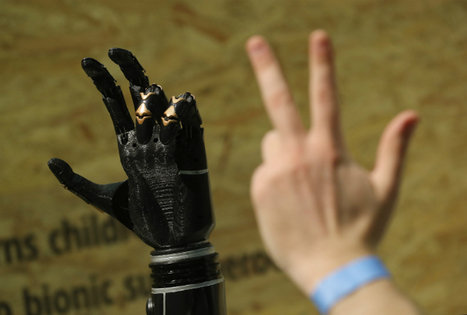 Your new post is loading...
 Your new post is loading...
Many people believed that modern technology will first replace the low wage jobs from the industries that are dependent on manual labor rather than intellectual work. However, the latest innovations in robotics and A.I. tend to contradict our previous beliefs: we are now entering a new era, of A.I. based design that hopefully, will change everything for the best. Until recently, computer generated design was regarded more as a sci-fi idea rather than a reality. The development of artificial intelligence was focused on other goals and nobody could have dreamed about it being capable of actually delivering something useful to mankind. Sure, we all have at least once admired beautiful fractals generated by computers but let’s face it, they were not actually visual designs. They were visual math and nothing more.
Ads used to just be ads. They were signs on the side of the road, or in our browsers. They were something that could be ignored. Visually loud, sure, but they weren’t a fundamental part of our conversations, relationships, or entertainment. But on the internet today, ads aren’t just part of the content or interface, they are the content and the interface. From what photos you see on Facebook, to the music you listen to on Spotify, to the videos you watch on Snapchat–it’s all served by algorithms that have quantified your response well enough to exploit your tastes, showing you things that you will almost certainly click on. By using these apps and services, we’re feeding the companies that control them immense amounts of data that, in turn, tailors the medium to fit our tastes. The difference between an ad and a piece of content, these days, is becoming technical. It’s an insight that echoes throughout Mary Meeker’s 2017 Internet Trends report, which she and Kleiner Perkins Caufield & Byers published yesterday afternoon. The report, which is heavily anticipated every year, contains hundreds of slides breaking down digital culture and business–everything from emerging markets in China to the rise of unboxing culture. But the trend that stuck out most to us this year? That the internet is now playing every user in one giant game we cannot escape. Here’s how....
The Mirai is Toyota’s car of the future. It runs on hydrogen fuel cells, gets 312 miles on a full tank and only emits water vapor. So, to target tech and science enthusiasts, the brand is running thousands of ads with messaging crafted based on their interests. The catch? The campaign was written by IBM’s supercomputer, Watson. After spending two to three months training the AI to piece together coherent sentences and phrases, Saatchi LA began rolling out a campaign last week on Facebook called “Thousands of Ways to Say Yes” that pitches the car through short video clips. “When we started to look at the people who were going to be interested in this car, we realized it was people who were new technology adopters,—it was psychologists; it was engineers,” said Chris Pierantozzi, ecd at Saatchi LA. “So we wanted to make an ad for almost every single potential buyer of this car—one for every type of Mirai driver. ”First, Saatchi LA wrote 50 scripts based on location, behavioral insights and occupation data that explained the car’s features to set up a structure for the campaign. The scripts were then used to train Watson so it could whip up thousands of pieces of copy that sounded like they were written by humans....
"The camera is already starting to replace the keyboard,” asserts Netra CEO, Richard Lee. The content that will dominate digital information flow will be visual, and for that reason image recognition is becoming a key component of marketing.His company derives insight from visual data, fostering understanding of how consumers engage with brands through engagement with images. Netra is a leader in visual intelligence and search that uses machine learning to help marketers make sense of imagery on social media. Some brands are already using image recognition to connect with and effectively market to their customers. They include Neiman Marcus. The upscale retailer offers its customers the Snap. Find. Shop app that enables them to use their phones to snap pictures of styles they like and find similar styles carried by the store. The app is demonstrated here:...
Those using AI use it for range of reasons, the most frequent being to get news or information. Here are the tasks consumers utilize artificial intelligence to help them with most often: 35% -- Information, news, weather, stocks 21% -- Read, write, text, phone call 17% -- Play music 9% -- Set timer or reminder 5% -- Make purchases, shopping lists...
Artificial Intelligence is being hailed as the new linchpin of the tech industry. Although machine learning algorithms have been around for decades, the advances in hardware processing capabilities and access to big data have ushered in a new era of AI applications. Areas like healthcare, IoT, and cybersecurity, where there are a massive number of data points available, were quick to adopt and experiment with AI algorithms. But deals are slowly emerging in other verticals like legal tech, travel tech, real estate, and media & entertainment. From established law firms investing in AI startups to smart money VCs backing AI companies in the gaming industry, newer possibilities are emerging every day. “Just as electricity transformed almost everything 100 years ago, today I actually have a hard time thinking of an industry that I don’t think AI will transform in the next several years.” - Andrew Ng, former chief scientist at Baidu The artificial intelligence deals tracker shows the distribution of AI deals across different categories. We focused on some of the emerging AI categories in the lower half of the heat map to analyze the use cases for AI in these industries, VC interest, startup funding, and notable startups to watch....
|
It was winter in New York City and Asaf Jacobi’s Harley-Davidson dealership was selling one or two motorcycles a week. It wasn’t enough. Jacobi went for a long walk in Riverside Park and happened to bump into Or Shani, CEO of an AI firm, Adgorithms. After discussing Jacobi’s sales woes, Shani, suggested he try out Albert, Adgorithm’s AI-driven marketing platform. It works across digital channels, like Facebook and Google, to measure, and then autonomously optimize, the outcomes of marketing campaigns. Jacobi decided he’d give Albert a one-weekend audition.That weekend Jacobi sold 15 motorcycles. It was almost twice his all-time summer weekend sales record of eight....
It's no secret that e-commerce has become an integral part of our economy - consumers spent over $51.5 billion in clothes, shoes, and handbags online in 2015. Clothing sales rose by 19%, largely because of the increase in mobile usage and free shipping options. But with access to billions of products, it's becoming increasingly difficult for online shoppers to keep it all straight. When asked what e-commerce trend to expect in 2017, Tracey Wallace, editor of BigCommerce, said: "We know consumers are shopping in micro-moments. They see an item they like (on Instagram or Facebook), they research it, they find other brands selling something similar, they compare prices, they read reviews and then they finally make a decision." Because the shopping experience is prompted through a number of mediums (email, social media, search, etc.,) many consumers are turning to apps that simplify and organize the shopping process. Jonathan Friedman, CEO of Shoptagr, believes that "the A.I. Shopping Assistant will become the future of e-commerce and online retail as we know it. While retailers have been leveraging A.I. for years, it is now the consumer who will capitalize on machine learning and automation tools for efficiency."...
AI and machine learning are central topics right now for anyone involved, not just in marketing, but in the whole lifecycle of the customer experience, through sales, service and retention. Massive advances are taking place in the space, and DMN is keeping on top of them.Here are some of our favorite recent AI pieces.
Representing 1,300 Google AdWords accounts and more than 176,000 active campaigns, the iProspect report provides an analysis and overview of the trends and opportunities relevant for brands that are taking a strategic, performance focused approach to paid search marketing.i iProspect’s Q1 year-over-year Google AdWords data showed strong mobile growth in terms of both impressions and clicks. Volume on desktops and tablets, however, was down, indicating an overall decrease in demand for those devices. Other key findings include: Cost per click increased across all devices, reaching the highest CPC recorded since this report’s inception in 2014 Mobile CPC saw a particularly significant increase, up 40% YoY, further closing the gap on desktop Mobile click share also continued to grow, as advertisers adapted their strategy based on the device-specific search preferences of consumers, and now represents 59% of all paid search traffic Google Shopping investment continued to grow, with advertiser investment up 44% YoY. Voice search, for instance, is quickly becoming the search method of choice for many consumers, says the report. Today, 500M people use a voice search-powered digital assistant of some kind, and half of all searches will be voice searches by 2020 (Tractica, 2016)....
What are the main ways AI/machine learning will impact marketers and their work in the next year or two? While AI has tremendous potential, I believe we are still a few years off from having it solve “real world” operational problems at scale. But in the meantime, marketers are benefitting from the speed and breadth of the insights afforded by AI. Early success examples have focused on creative – we've started to see the optimisation of creative using AI, such as improved digital product experiences (see Olay's skincare app as an example) and of course much better media targeting (such as Demandbase's new AI product). Both B2C and B2B marketing stands to gain from AI. In summary, what will be the long-term impact of AI/machine learning on marketing? AI and machine learning will enable full personalisation of the customer experience, driven by the real-time integration of media, creative and analytics. Marketers will be more efficient, and customers will receive more relevant information in the right place at the right time....
Since the beginning, marketing has required a balance between analysis and execution. Especially in digital marketing, the cycle of analyze > optimize > execute > repeat is the nucleus of all successful initiatives. But the age of cognitive marketing has begun, and robot assistants will handle more and more of the creation duties that used to belong to human marketers. IBM (a Convince & Convert partner) is the forward guard of this movement, with their Watson Marketing suite of tools and APIs powering an increasing number of real-time analysis and optimization opportunities. The IBM Think Marketing portal, for example, uses the Watson CMS to automatically serve up a different mix of content based on what you’ve read in the past. This past weekend gave us another glimpse of marketing’s future, at The Masters golf tournament. IBM is a long-time sponsor of the storied event and provides all the technology for the tournament, using it as a product showcase. This year, for the first time, IBM used Watson’s cognitive capabilities to automatically determine which video clips should appear on the official Masters website and mobile app1. Based on real-time signals such as loudness of crowd reaction and announcers’ use of superlatives in their commentary (the shot was “terrific” or “spectacular,” etc.), Watson instantly identifies a snippet of video as a highlight, tags it, and pushes it live in seconds, including to Twitter....
|



 Your new post is loading...
Your new post is loading...



















While design and marketing go hand in hand and we are already aware that there are A.I.s out there capable of performing both these tasks.